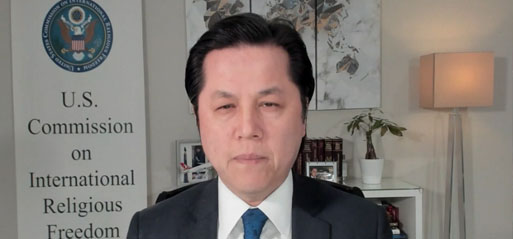
The US Commission on International Religious Freedom (USCIRF) Chair, Nury Turkel
(Credit: PBS)
Hamed Chapman
The US Commission on International Religious Freedom (USCIRF) has criticised the US State Department for turning a blind eye by not including India on the list of “countries of particular concern” under the International Religious Freedom Act.
Commission Chair, Nury Turkel, said there was “no justification” for the State Department’s failure to recognise India or Nigeria as “egregious violators of religious freedom,” as they each clearly meet the legal standards for designation.
“USCIRF is tremendously disappointed that the Secretary of State did not implement our recommendations and recognise the severity of the religious freedom violations that both USCIRF and the State Department have documented in those countries,” Turkel said in a statement.
The US has designated 12 countries, including China, Pakistan and Myanmar, as “countries of particular concern” for the current status of religious freedom in these nations. Other countries listed by US Secretary of State Antony Blinken were Cuba, Eritrea, Iran, Nicaragua, North Korea, Russia, Saudi Arabia, Tajikistan, and Turkmenistan.
The list is based on countries considered to have “engaged in or tolerated, particularly severe violations of religious freedom” under the US International Religious Freedom Act. In an end-of-year update last month, the USCIRF specified that religious freedom and related human rights in India are under ongoing threat. It was the fourth consecutive time that the Commission had found “severely deteriorating” religious freedom in India.
Last April, the Commission recommended the State Department designate India as a “country of particular concern,” saying that religious freedom conditions in India had “significantly worsened” in 2021.
“During the year, the Indian government escalated its promotion and enforcement of policies—including those promoting a Hindu-nationalist agenda—that negatively affect Muslims, Christians, Sikhs, Dalits, and other religious minorities,” it had said in its report. The failure of the State Department to include India comes as the Pew Research Centre think-tank placed India at the top of its 2020 Social Hostilities Index (SHI) involving religion in the context of the impact of COVID restrictions.
The rise in India’s SHI score, which was already in the ‘very high’ category, was attributed “in part to increased violence around protests of the Citizenship Amendment Act (a 2019 law that excludes Muslims from expedited citizenship).”
The report focuses entirely on “how COVID-19 restrictions affected religious groups around the world in 2020” and note the controversy surrounding the Tablighi Jamaat meeting in Delhi in the early days of the pandemic and the subsequent use of “Islamophobic hashtags like #CoronaJihad” that “circulated widely on social media, seeking to blame Muslims for the virus.”
Three other countries—Argentina, Italy, and the US—along with India were singled out on Pew’s list that saw private actors use force against religious groups, involving physical violence or vandalism for COVID-related reasons.
In India, there were “multiple reports of Muslims being attacked after being accused of spreading the Coronavirus,” the report says. In the list of 198 countries, Nigeria recorded the second-highest index score of social hostilities involving religion after India, followed by Afghanistan, Israel, Mali, Somalia, Pakistan, Egypt, Libya, Syria and Iraq.